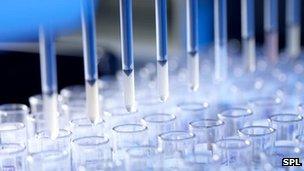Over-the-counter HIV tests backed by US panel
- Published

Blood tests have traditionally been used to detect the HIV virus
Over-the-counter HIV tests that would allow people to check in the privacy of their homes if they have the virus have moved a step closer in the US.
A panel of experts said the OraQuick In-Home HIV Test was safe and effective and its potential to prevent infections outweighed the risk of false results.
The Food and Drug Administration will decide this year whether to approve it.
The 20-minute test is 93% accurate for positive results and 99.8% for negative, the manufacturer said.
HIV affects nearly 1.2m people in the US, with 50,000 new cases each year.
'Game changer'
Experts on the Blood Products Advisory Committee voted 17-0 to back the test, saying it would help people who are HIV-positive get access to healthcare and social services.
They urged Pennsylvania-based OraSure, the company that manufactures the product, to include highly visible warnings about false negative results.
The panel also advised that the packaging should carry a toll-free phone number offering counselling to those testing positive.
Carl Schmid, deputy director of the AIDS Institute, welcomed the panel's approval on Tuesday of the home test.
"We are always looking for game changers, and we believe this is one of them," he told the Associated Press.
"Not only will it help reduce the number of infections but it will bring more people into care and treatment."
The Food and Drug Administration (FDA) does not have to follow the recommendations of the advisory panel, though it usually does.
In 2004, the FDA approved a 99%-effective version of the test for use by healthcare professionals.
OraSure said the home test could retail for less than $60 (£37) if approved.
To take the test, the user swabs the outer gum area so the oral fluid, which is not the same as saliva, can be checked for the HIV virus.
The test provides results within about 20 minutes, but experts say the results should be confirmed with a blood test, which is more accurate.
Last week, a separate FDA panel approved a drug called Truvada, which could become the first drug in tablet form to protect healthy people from the HIV virus.
- Published1 December 2012
- Published11 May 2012